Many in the Eurozone suspect it was PM Alex Tsipras’ end game to have the country out of the euro
AS GREEKS line up to withdraw their cash, the PM has said he will accept a conditional bailout. But he’s asked for one thing.
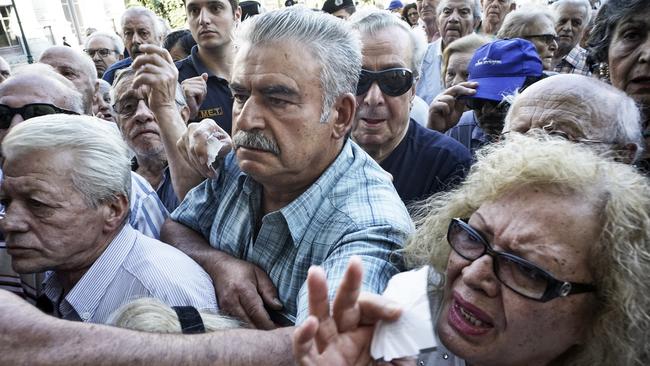
GREECE’S Prime Minister Alex Tsipras’ has said he will accept a bailout offer but with several conditions.
Mr Tsipras has written to creditors saying he is ready to accept bailout terms but has insisted on several further conditions, European sources said.
The letter received in Brussels says it accepts most of the terms in an offer that was made public on Sunday by European Commission President Jean-Claude Juncker, but sources said there were “substantial” changes.
The Hellenic Republic is prepared to accept this... agreement subject to the following amendments, additions or clarifications,” the letter said, referring to the reforms-for-cash contract binding Greece with its creditors
Q&A: All your questions answered on the situation in Greece
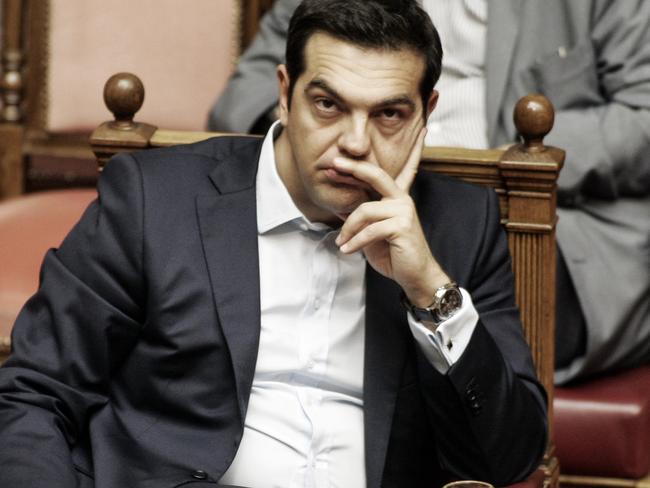
The government said any deal would have to allow Greece to maintain a 30 per cent VAT discount on islands and postpone a 2012 pension reform until October 2015.
The European Commission will submit its assessment of Greece’s demand for a new two-year loan program to the finance ministers of the 19 nations using the euro.
Tsipras: Vote ‘No’ at referendum for better deal with creditors
Mr Tsipras said his country will still hold a referendum on the terms of its bailout, urging people to vote ‘No’ in order to win a better deal.
“A ‘No’ vote does not signify a rupture with Europe, but a return to the Europe of values,” he said, rebutting accusations from EU leaders that the plebiscite was essentially a vote for or against staying in the European Union.
Defying the creditors at the referendum would place them under “great pressure to continue” with negotiations, and as such it would be a “decisive step for a better deal.”
However the Council of Europe said the Greek referendum on bailout proposals planned for Sunday was organised too hastily and is not up to European standards.
“It is obvious that the timeline is too short with regards to our standards,” said Daniel Holtgen, spokesman for the Council’s secretary general Thorbjoern Jagland. “There are at least three criteria on which the Council of Europe has concerns about the validity of the proposed referendum.”
Voters should have the referendum questions at least two weeks” before it is held, he said.
Mr Holtgen said the questions were also not sufficiently “clear and understandable.”
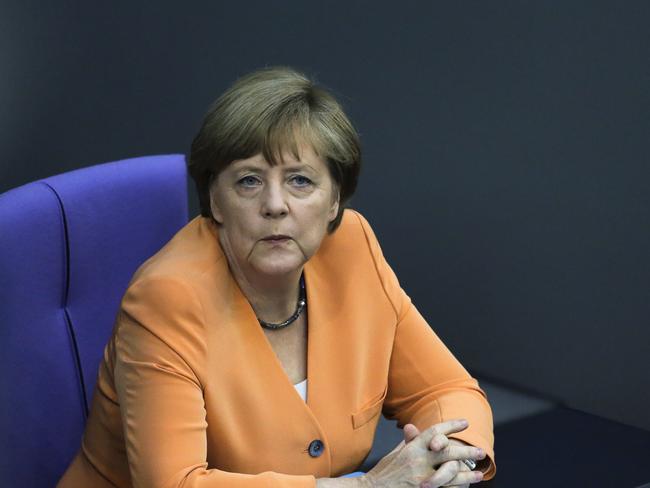
All the finance ministers, including Greece, are soon to hold a teleconference meeting.
Commission Vice-President Valdis Dombrovskis says it’s up to the member countries to decide what action to take, but warns that the Greek request is being considered in “a different economic situation” than offers last week. That suggests any decision could take time.
The Commission is also urging the European Financial Stability Facility — Greece’s biggest creditor — not to call in its loans to Greece until decisions on a possible new bailout have been made.
Merkel says ‘Europe’s future not at stake’ in Greek crisis
German Chancellor Angela Merkel said that “the future of Europe is not at stake” from the Greek crisis but warned against striking a compromise at any price that could weaken the EU.
“Yes, these are turbulent days. And the stakes indeed are high,” Merkel told Germany’s Bundestag lower house of parliament, a day after debt-laden Greece crashed out of an EU aid program.
“The world is watching us. But the future of Europe is not at stake. The future of Europe would be at stake if we forgot who we are and what makes us strong — a community based on rules and responsibility,” she said.
“If we forgot that, the euro would fail, and with it Europe,” said Merkel, who through years of eurozone turmoil has championed tough reforms and cost-cutting in return for bailout cash from the EU, European Central Bank and International Monetary Fund.
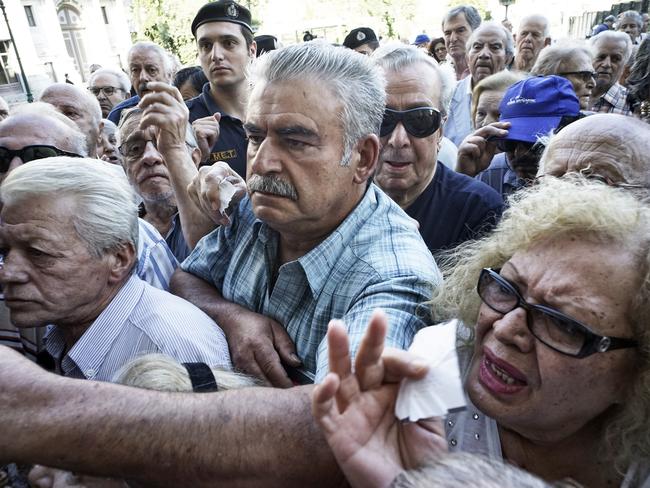
She said that after years of crisis Europe had become “more robust” and that although the present situation was difficult “it is primarily a source of agony for the people of Greece”.
Merkel said Europe could now “calmly” await the outcome of a referendum called for Sunday by Greek Prime Minister Alexis Tspiras on the country’s bailout terms, because the bloc was “strong”.
She reiterated earlier remarks by her finance minister, Wolfgang Schaeuble, that a new aid deal between Greece and its creditors could not be negotiated before Sunday’s referendum.
The chancellor stressed she didn’t want a half-hearted compromise with Greece, but rather seeks an outcome that shows a globalised world that a strong EU sticks to its rules and values.
“I don’t want us to get through the crisis any which way, to seek calm as quickly as possible and say all’s well,” Merkel said.
“I want Europe to emerge stronger from the crisis than it went into the crisis, so that we are strong as we compete with China, India, South America and others, so that we can convincingly stand for our interests, our way of doing business, of working, of living, and our values — freedom, human dignity and the rule of law,” Merkel told lawmakers.
The millions at play “in fact do not represent an insurmountable hurdle”, Merkel said, but she warned that “a compromise at any price would be a compromise for the sake of compromise”.
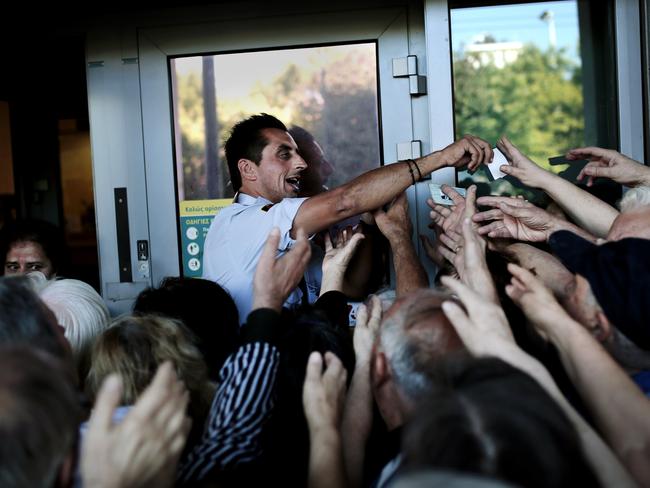
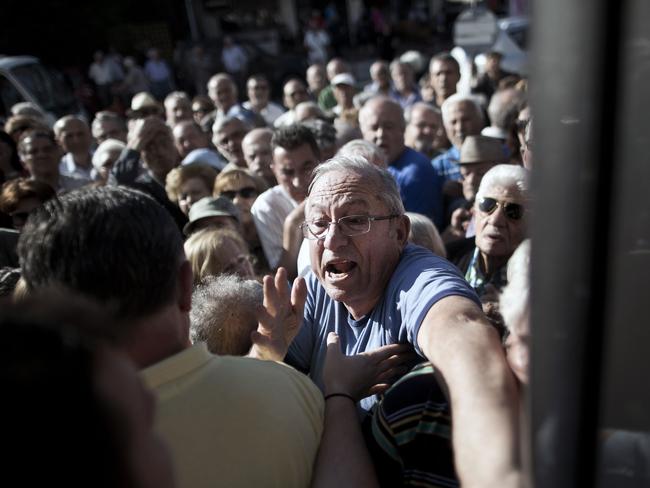
Greece misses deadline
Greece officially became the first developed country in the world to go into arrears after missing a payment deadline to the International Monetary Fund.
The last country to be in this position was Zimbabwe in 2001 and more than a decade on its still a pariah on the world money markets.
The first immediate effect of the default was the loss for Greek access to more than 10 billion euros to recapitalise banks.
Where that leaves the banks, most of which have remained shut since last weekend is not clear.

About 1000 banks did open briefly on Wednesday to assist pensioners who traditionally do not use ATM bank cards, and allowed them to withdraw 120 euros each, double the daily cap placed on other savers through ATMs.
But some Greek islands have already reported they have run out of cash flows and numerous businesses across the country have already begun to refuse credit cards with “cash only” signs going up on shop windows.
Some petrol stations in Athens closed four hours early as stocks ran low due to over demand from panicked citizens but many were expecting tanker deliveries as per normal on Thursday.
The panic was still evident at ATMs however with seemingly the entire population still trying to stock up on cash with queues snaking around the block in Athens at most machines.

The only bright spot for the rest of Europe was the value of the euro did not change much against the other currencies after the default, suggesting it was now a little more robust than previously thought.
Just hours before the midnight default deadline, the Greeks made a last-ditch effort to maintain its bailout program it has relied upon for five years, with the move rejected by the Eurozone as simply too little too late.
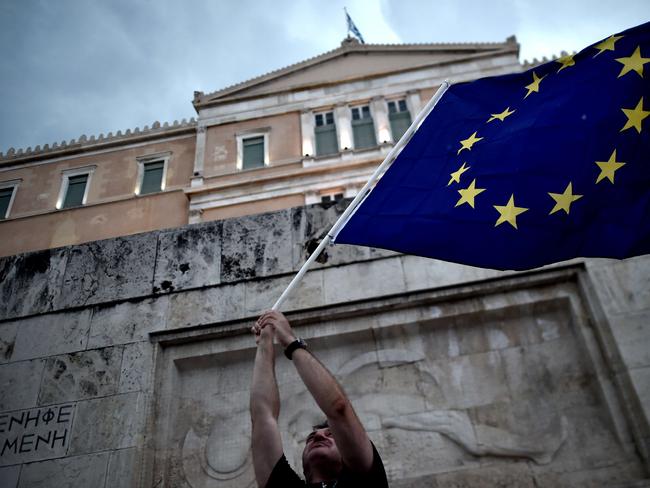
The vote, in which voters are to be asked yes or no to remaining in the Eurozone with the government urging its people to vote no, is being seen as yet another step by Greece to leave the European Union; Russia has already said it is ready to form an alliance with Greece and financially assist the nation.
In the game of brinkmanship that has been a constant feature of Greek negotiations, Deputy Prime Minister Yannis Dragasakis hinted that the government could be prepared to calling off the popular vote, saying it was a political decision, if the EU continued with the bailout program.
The 19 EU Finance ministers did hold a late night teleconference call on the issue but unanimously declared it was no longer time to make such a decision.
“It would be crazy to extend the program, so that cannot happen and will not happen,” Dutch Finance Minister Jeroen Dijsselbloem, who heads the eurozone finance ministers’ body, said.
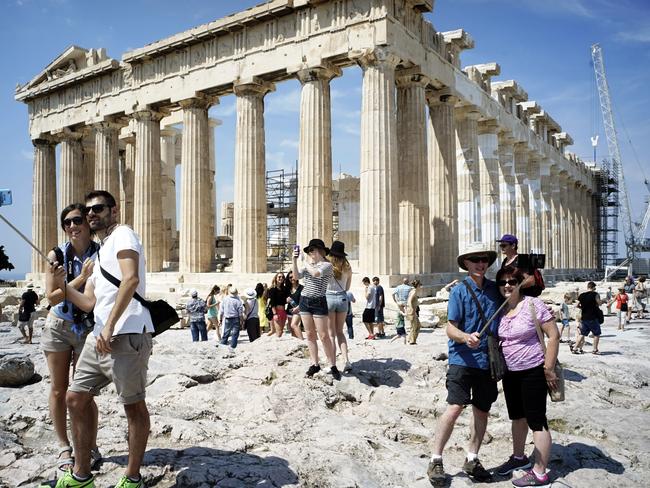
With Greece’s game playing position throughout the whole crisis, some Eurozone nations had actually expected the default loan figure to be paid thereby drawing out the bailout program a little longer but many now suspect it was always Tsipras’ end game to have the country out of the euro.
One of the founding fathers of the euro former European Central Bank chief Otmar Issing said Greece had played about with the fate of its people and the crisis now was clearly its own fault and that of the government which has shown no commitment to making changes.
But he also said the EU failed to insist early enough on Greece to make changes and were simply too polite.
Yesterday more than 10,000 people took to the streets to appeal for Greeks to vote to stay in the Eurozone. More rallies for both sides of the debate are expected before Sunday.



